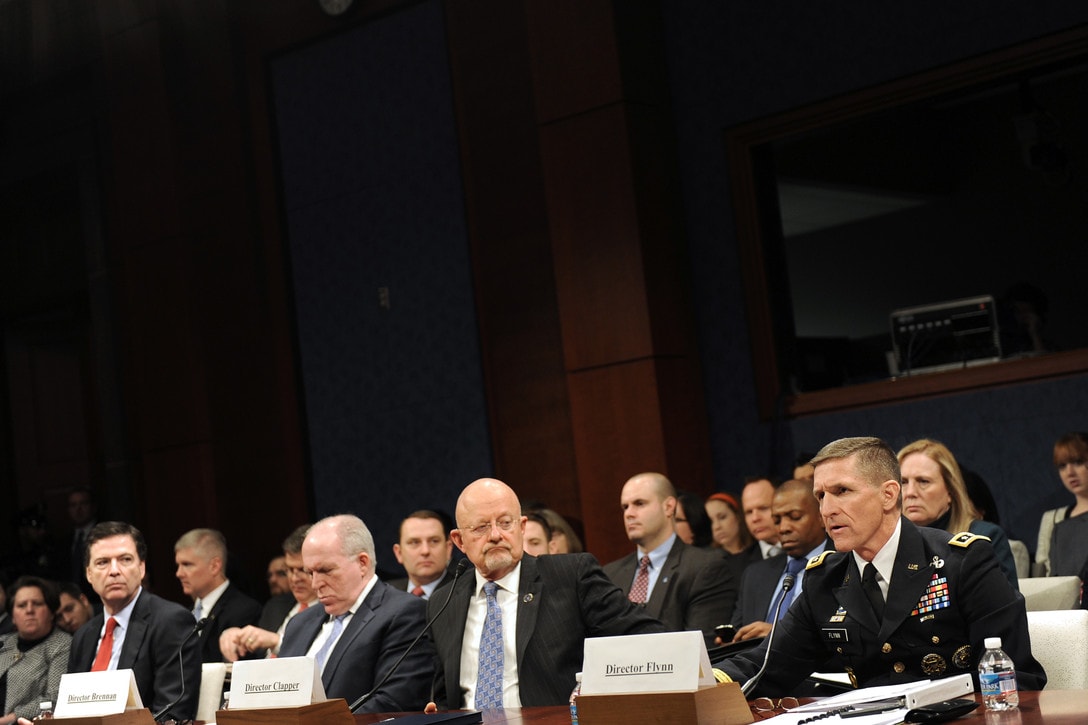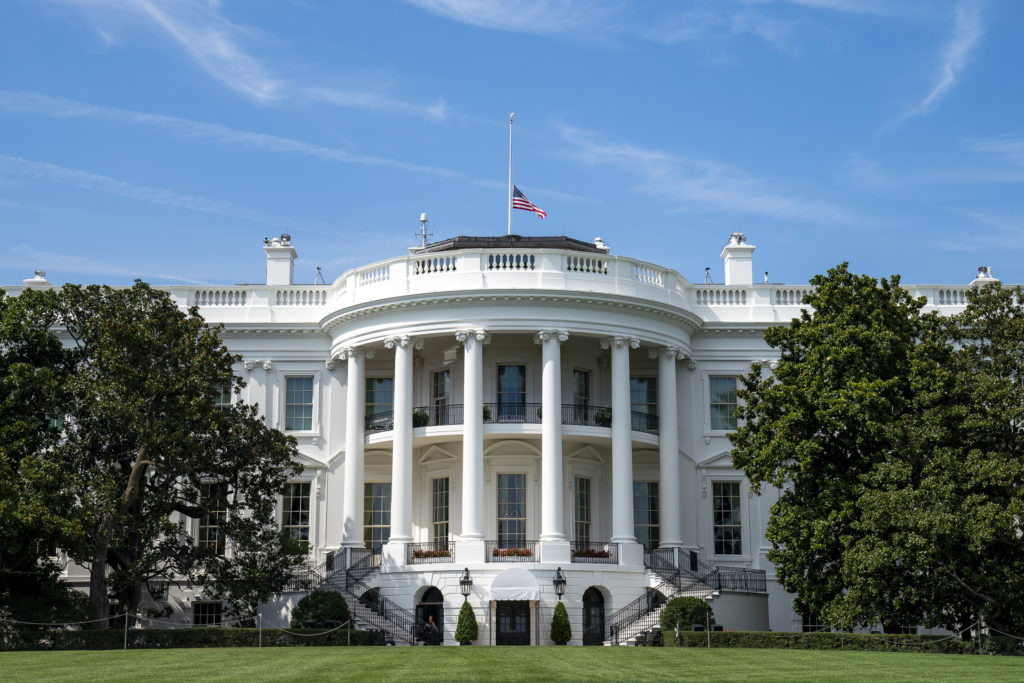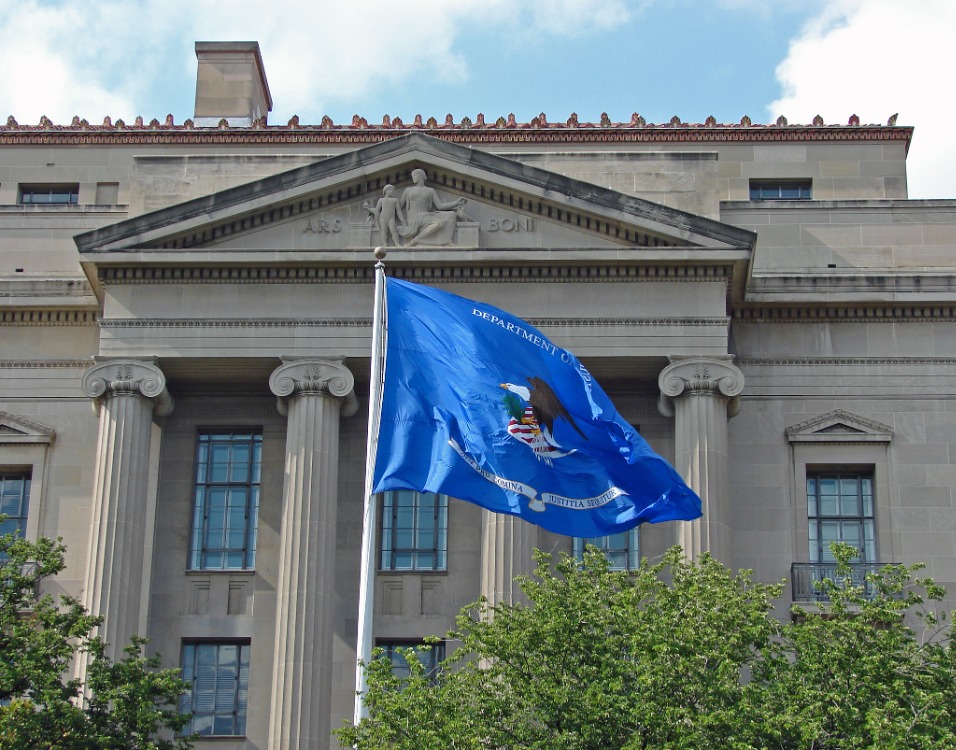The Dangers in the Trump-Brennan Confrontation
President Trump’s revocation of former CIA Director John Brennan’s security clearance brings together in an unfortunate way two pathological trends in the Trump era, and highlights the conundrum of the former intelligence official who wishes to speak out against the president’s attacks on the Russia investigation and the intelligence community more generally.

Published by The Lawfare Institute
in Cooperation With

President Trump’s revocation of former CIA Director John Brennan’s security clearance brings together in an unfortunate way two pathological trends in the Trump era, and highlights the conundrum of the former intelligence official who wishes to speak out against the president’s attacks on the Russia investigation and the intelligence community more generally.
The first trend is the politicization of intelligence. Through the 1970s, the intelligence community used its domestic surveillance powers to commit two kinds of abuses. FBI Director J. Edgar Hoover, for example, engaged in political abuse when he served political masters by spying on disfavored Americans (such as suspected communists, political dissidents and antiwar protesters) for political ends. And he engaged in sabotage when he used secret intelligence to further his or the FBI’s institutional interests at the expense of elected officials, sometimes to influence policy. Hoover’s key sabotage mechanism was to leak or threaten to leak secretly collected information about government officials or their friends and family either to enhance his power over the official or to achieve some other political end.
Ever since the domestic intelligence abuses by Hoover’s FBI and other agencies came to light in the 1970s, the intelligence community has been governed by a “grand bargain”: It was allowed to continue to surveil domestically in the homeland but became subject to legal restrictions on the collection, analysis, and dissemination of intelligence information; strict reporting requirements to Congress; intra-executive monitoring by lawyers and inspectors general; and judicial oversight. The grand bargain went a long way toward eliminating political abuse and, to some degree, also the sabotage. As Benjamin Wittes and I explained last year, the intelligence community’s compliance with the grand bargain helped bolster trust in it and its own legitimacy, which it needs to operate in secret, as national security requires, to protect the nation.
Since the beginning of the Trump presidency, the grand bargain, and the de-politicization of the intelligence community it was supposed to guarantee, have been under fierce assault from many quarters. The story begins with Russian meddling in the 2016 election, followed by the appropriate but inevitably politically fraught counterintelligence investigation of a Republican presidential campaign by a Democratic administration. As Wittes and I wrote, the investigation invariably “entered the dangerous land of surveillance related to politics,” and from the beginning it “spelled trouble for a community that wants, and needs, to stay clean of politics.”
In that unfortunate context came the main cause of the intelligence community’s difficulties: President Trump’s unceasing and increasingly heated charges that the investigation of Russian meddling is in fact politically motivated—attacks that sought to destroy intelligence community credibility. A string of unfortunate events—especially the unusual, so-called “Steele dossier” and Peter Strozk’s seemingly biased texts—gave the president’s mostly irresponsible charges a patina (or more) of credibility in many quarters. And Rep. Devin Nunes, the chairman of the House intelligence committee, churned this and other information in usually misleading and almost always norm-breaking ways that had the effect of further diminishing trust in the intelligence community.
But Trump and his allies are not the only culprits here. In reaction to perceived evils by Trump campaign and transition officials, members of the intelligence community—intelligence bureaucrats or outgoing Obama national security officials, or both—contributed a lot to diminishing trust in the intelligence community when they leaked, early in the Trump administration, a great deal of U.S.-person information collected from FISA warrants in order to bring down Trump’s national security adviser and achieve other anti-Trump goals. As Wittes and I wrote last year, “these leaks violated the core [Grand Bargain] commitment not to politicize the use of surveillance tools or the fruits of their use.” The leaks hurt Trump, but they also hurt the intelligence community a great deal, and probably for a longer term, by making Trump’s politicization charges credible. It was an unnecessary shot in the foot since the issues that the leaks sought to shed light on were under full official investigation.
This leads to the second unfortunate trend during the Trump era: the president’s uncanny ability to induce his critics to break norms in response to his norm-breaking behavior, in the process lending credibility to his critiques. This was a major theme of my Atlantic essay last fall. The FISA leaks break norms and confirm to many that the intelligence community in general and the Russia investigation in particular are politicized. The press often overreacts to Trump by (in Bob Woodward's words) “binge-drinking the anti-Trump Kool-Aid,” thereby lending credence to Trump’s charges of bias and the shortcomings of “the fake-news media.” Some early lower-court reactions to the Trump immigration orders confirmed to many the appearance of such bias when they issued heated opinions that failed to pay the president proper deference and respect in cases touching on immigration and national security.
Which brings me to the reaction to Trump by the big guns in the intelligence community. It has been awkward to watch many former very senior intelligence officials go on television, often in groups of two or three, to blast the president, especially when they touch on the topic of Robert Mueller’s investigation of Russian election interference. It is awkward because intelligence professionals have typically shied away from such sharp and, in the aggregate, one-sided public criticisms of a president. And it becomes unseemly (as Eli Lake notes today) when they discuss a matter under investigation on which they had access to classified information while in government, since that appears to prejudge a case based on information that cannot yet be publicly assessed.
I don’t for a moment deny these officials’ right to speak out against the President as long as they don’t reveal classified information. Indeed, I share almost all of the concerns I have heard them state about Trump. I understand why they they are speaking out, even if I sometimes wish they moderated their tone (as I sometimes wish I moderated mine). The president is viciously and inappropriately attacking the intelligence community that these men and women have long served and feel compelled to defend, especially since no one in the government is defending them publicly. He has also attacked some of these men and women personally in ways that are hard not to respond to. Trump has a way of making silence seem like acquiescence in evil, and of provoking a responsive attack. Finally, I imagine that these officials believe that the norm of avoiding criticism of the president is premised on a belief that the president acts in good faith—a belief that is absent here.
But however understandable or admirable the motivation, the fact is that for many Americans the relentless attacks on Trump by scores of senior long-term intelligence officials lend credibility to the president’s claims of a politicized “Deep State” bureaucracy that seeks to preserve its elite authority and reverse the results of the election by non-democratic means. It is not clear what these attacks on Trump add to the loud chorus of his other elite critics. But I do think that the credibility of the intelligence community as neutral and trustworthy suffers as a result. I might be wrong about this, especially compared to the option of the officials remaining silent. But if I am right, it is ironic that intelligence officials who are speaking out because of (as former Director of National Intelligence Jim Clapper put it) “genuine concern about the jeopardy and threats to our institutions” may be exacerbating the problem by doing so. It might also be that they are in the terrible position of watching those institutions be harmed whether they remain silent or speak out—it might be Trump’s particular skill that the institutions lose big either way.
Former CIA Director John Brennan has shown the least discipline on these matters. He is of course allowed to criticize the president’s immigration and trade policies (among many others that he trashed). But I don’t think it is prudent, or good for intelligence community credibility, for him to seem so sharply political about so many disparate matters. The CIA director when the Russia investigation opened also seemed to go too far in tweeting earlier this year, without further explanation, that the president’s “concern over the Russia investigation” was “well deserved.” Was this judgment based on the information Brennan saw in government? Was Brennan accusing the president of collusion? I had a similar question, and thought it just as imprudent, when Brennan asserted that it was “implausible that Russian actions did not influence the views and votes of at least some Americans.” I also thought it imprudent when Brennan said: “When the full extent of your venality, moral turpitude, and political corruption becomes known, you will take your rightful place as a disgraced demagogue in the dustbin of history.” And also when he claimed that the president’s Helsinki press conference was “nothing short of treasonous.” There are many other examples, including many instances of Brennan tweeting Trump-like personal vile at the president.
It is not hard to see why Trump saw Brennan as the perfect mark for his first security-clearance revocation. I want to be clear: It was a despicable thing for the president to do, since it was intended as punishment for Brennan’s exercise of his First Amendment rights. The revocation was within the president’s power but also was an abuse of power.
But Trump got exactly the reaction he wanted: Brennan responded with an intemperate op-ed that accused the president of collusion with the Russians in the 2016 election. Senate Intelligence Committee Chairman Richard Burr, who has been even-handed about Russian meddling and a defender of the Mueller investigation, criticized Brennan’s op-ed for “purport[ing] to know, as fact, that the Trump campaign colluded with a foreign power.” Burr added: “If his statement is based on intelligence he has seen since leaving office, it constitutes an intelligence breach. If he has some other personal knowledge of or evidence of collusion, it should be disclosed to the special counsel, not The New York Times.”
Brennan’s former colleague, Clapper, who himself has been very critical of the president, said Sunday on CNN that “John and his rhetoric have become an issue in and of itself.” Clapper also agreed with CNN’s Jake Tapper that “John Brennan’s hyperbole is in issue here, is one of the reasons we’re having this crisis.” Others are having a similar reaction. Even Brennan appears to get that his rhetoric is self-defeating. “Sometimes my Irish comes out and in my tweets,” he told Rachel Maddow in the course of preposterously claiming that he was not accusing the president of treason when he tweeted that his Helsinki behavior was “nothing short of treasonous.”
Then there was the extraordinary letter from more than a dozen former senior intelligence officials denouncing Trump’s revocation of Brennan’s security clearance. The letter was an understandable and appropriate reaction to the president’s actions. The mainstream media deemed it a stinging rebuke to the president. But I don’t think it will cause the president even marginal pain. If anything, it will confirm his and his supporters’ worldview about an elite, self-serving, politicized Deep State. Few things are so important in Washington, but so unimportant to ordinary Americans, as a classified information security clearance. To many Americans, front-page complaints about losing such a clearance, even when tied to the First Amendment abuses, will be viewed as a cabalistic concern. Again, I understand the letter signers’ action—silence in that unprecedented context was not an option. But I am not surprised that the White House is planning more clearance revocations. It appears to think the president won the first round.
The big loser in all of this is intelligence community trust, on which we all depend for our safety. And the main cause is our institution-destroying president, who sees political advantage in attacking the intelligence community. Trump seems to realize that the more vile his personal attacks and the more norm-defying his actions, the more likely he is to invite a norm-defying response that lends credibility to the basis of his original attacks. He also seems to realize that in pursuing his goal of crushing these institutions, he wins if the objects of his attack are silent or if they respond—a point that applies as well (as I noted last year) to the media.
In this light, it is hard to know precisely what the former senior intelligence officials who wish to defend the intelligence community should be doing. I think that the decision is personal and contextual and that silence (like that of William McRaven and Robert Gates, until recently, and President Obama’s) is an appropriate option. But for those who feel that speaking out is best, my modest advice would be as follows. First, avoid appearing on television in a panel of other senior former intelligence professionals for group criticism of the president. Second, be scrupulous in maintaining a temperate, sober tone. Third, if you worked on Russian election meddling during the Obama administration, avoid stating any conclusions about the president and that meddling, and always be unambiguously clear that whatever judgments you make are not based on information you saw in government. Fourth, avoid attacking the president on substantive matters outside your expertise.





